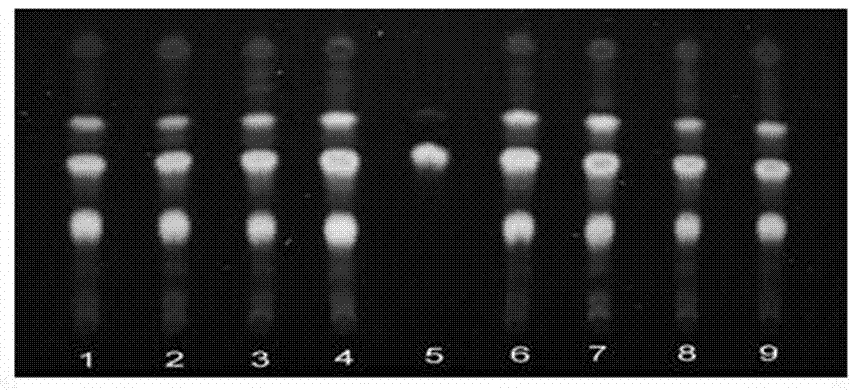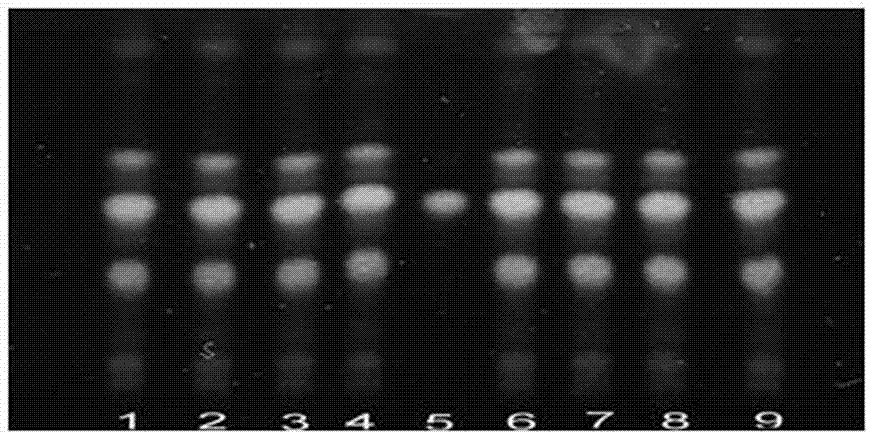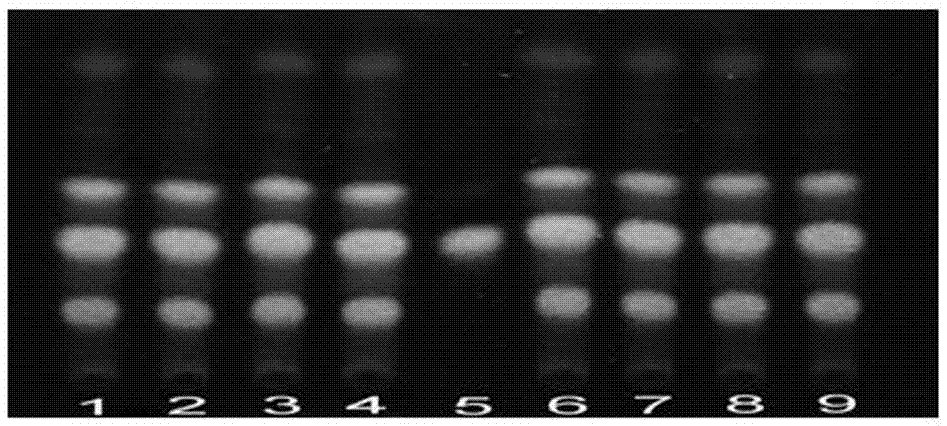TLC (Thin layer chromatography) rapid identification method for cacumen biotae
An oriental orientalis leaf and fast technology is applied in the field of TLC rapid identification of oriental orientalis leaves, which can solve the problems such as the inability to meet the needs of quickness and simplicity, the large amount of organic reagents, the cumbersome operation steps, etc., and achieves the reduction of discomfort and danger. Reproducible, chromatographically clear results
- Summary
- Abstract
- Description
- Claims
- Application Information
AI Technical Summary
Problems solved by technology
Method used
Image
Examples
Embodiment 1
[0028] A kind of fast TLC identification method of orientalis leaves, the steps comprising:
[0029] (1) Take 3g of the sample powder to be tested, add 25mL of water, add 3mL of hydrochloric acid, add 40mL of ethyl acetate, heat and reflux in a water bath for 30min, and filter while it is hot. 3 times, 10mL each time, evaporate to dryness in a water bath, add 5mL of methanol to dissolve the residue, and use it as the test solution;
[0030] (2) Separately take quercetin standard substance and add ethanol to prepare a 0.1mg / mL solution as the reference solution;
[0031] (3) According to the 2015 edition of the Chinese Pharmacopoeia Part IV 0502 thin-layer chromatography test, draw 3 μL of the test solution and the reference solution, respectively, and spot on the same silica gel G thin-layer plate, with toluene at a volume ratio of 5:2:1 -The upper layer solution of ethyl acetate-formic acid was developed with a developing agent, taken out, dried in the air, sprayed with 1wt%...
Embodiment 2
[0034] A kind of fast TLC identification method of orientalis leaves, the steps comprising:
[0035] (1) Take 2g of the sample powder to be tested, add 20mL of water, add 2mL of hydrochloric acid, add 30mL of ethyl acetate, heat and reflux in a water bath for 20min, filter while hot, put the filtrate in a separatory funnel, separate the liquid, take the ethyl acetate layer, wash with water 3 times, 10mL each time, evaporate to dryness in a water bath, add methanol 4mL to dissolve the residue, and use it as the test solution;
[0036] (2) Separately take quercetin standard substance and add ethanol to prepare a 0.05 mg / mL solution as the reference solution;
[0037] (3) According to the 2015 edition of the Chinese Pharmacopoeia Part IV 0502 thin-layer chromatography test, draw 2 μL each of the test solution and the reference solution, and spot them on the same silica gel G thin-layer plate, and use toluene with a volume ratio of 4:2:1 -The upper layer solution of ethyl acetate...
Embodiment 3
[0040] A kind of fast TLC identification method of orientalis leaves, the steps comprising:
[0041] (1) Take 4g of the sample powder to be tested, add 30mL of water, add 4mL of hydrochloric acid, add 50mL of ethyl acetate, heat and reflux in a water bath for 40min, filter while hot, put the filtrate in a separatory funnel, separate the liquid, take the ethyl acetate layer, wash with water 3 times, 10mL each time, evaporate to dryness in a water bath, add 6mL of methanol to dissolve the residue, and use it as the test solution;
[0042] (2) Separately take quercetin standard substance and add ethanol to prepare a 0.15 mg / mL solution as the reference solution;
[0043](3) According to the 2015 edition of the Chinese Pharmacopoeia Part IV 0502 thin-layer chromatography test, draw 3 μL of the test solution and the reference solution, respectively, on the same silica gel G thin-layer plate, and use toluene with a volume ratio of 6:2:1 -The upper layer solution of ethyl acetate-fo...
PUM
 Login to View More
Login to View More Abstract
Description
Claims
Application Information
 Login to View More
Login to View More - R&D Engineer
- R&D Manager
- IP Professional
- Industry Leading Data Capabilities
- Powerful AI technology
- Patent DNA Extraction
Browse by: Latest US Patents, China's latest patents, Technical Efficacy Thesaurus, Application Domain, Technology Topic, Popular Technical Reports.
© 2024 PatSnap. All rights reserved.Legal|Privacy policy|Modern Slavery Act Transparency Statement|Sitemap|About US| Contact US: help@patsnap.com










